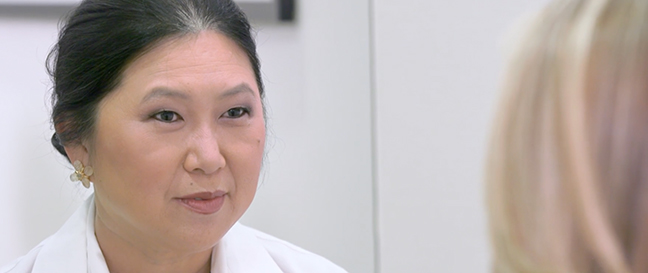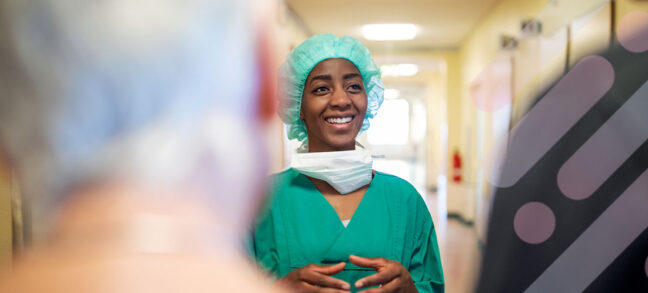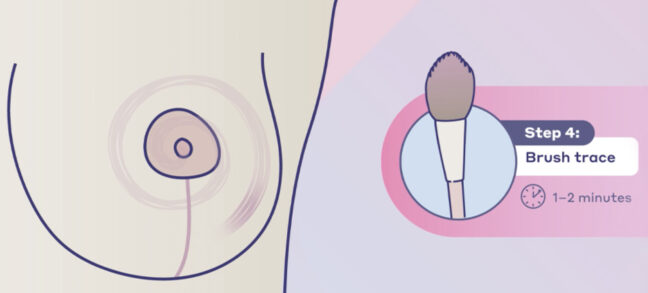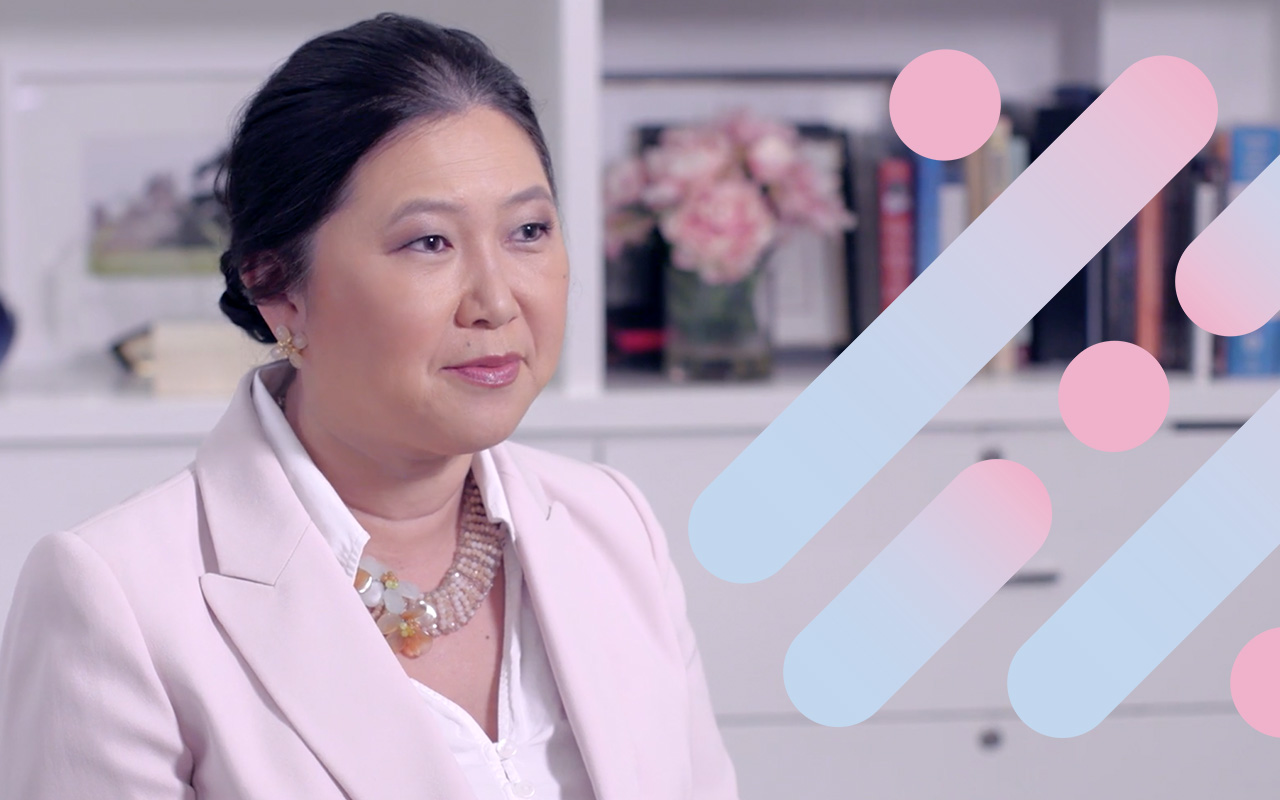Women choose to have a mastectomy as a life-saving measure, but they are often dismayed to find their breasts are numb after the procedure. The loss of breast sensation is a common and sometimes devastating side effect of breast removal surgery. For some women, the lack of sensation can act as a roadblock that prevents them from fully recovering mentally and emotionally from their breast cancer diagnosis and treatment.1
However, women undergoing autologous (flap) breast reconstruction now have the opportunity to potentially restore feeling with Resensation™, a breast nerve repair technique that reconnects nerves damaged during a mastectomy. Resensation is performed by a growing number of plastic microsurgeons across the U.S.
Constance M. Chen, MD, is a board-certified plastic surgeon who offers Resensation with all autologous, or natural tissue, breast reconstructions. Her surgical practice in New York City focuses on restorative breast surgery, and she says Resensation represents the next frontier in breast reconstruction.
“I think Resensation is a wonderful advancement, both as a surgeon and as a woman,” said Dr. Chen.
Dr. Chen shared her thoughts on why it’s important to offer Resensation to women undergoing flap-based breast reconstruction, the power of restoring sensation after a mastectomy, and why she believes Resensation represents a major advance in the field of breast reconstruction.
How are you using Resensation in your practice in women undergoing flap reconstruction?
Resensation has been a game-changer in my practice. With the Resensation technique using Axogen’s allograft nerve tissue, I am able to perform nerve repair on just about all body types. Previously, nerve restoration was very dependent on the woman’s anatomy and the condition of her nerves.
Now, I can perform Resensation on just about all of my patients undergoing natural tissue breast reconstruction.
The most common surgeries I perform using Resensation are DIEP flap or PAP flap breast reconstruction. The DIEP flap takes tissue from the lower abdomen to recreate the breasts, using the same incision and tissue as in a tummy tuck. The PAP flap2 takes tissue from the upper thigh to recreate the breasts, using the same incision and tissue as in a thigh lift. The DIEP flap often works well for women who have extra lower abdominal tissue after pregnancy. The PAP flap can be a good option for very thin women with flat stomachs, many of whom are told by other surgeons that natural tissue breast reconstruction is not possible for them.

How about women who have had implant-based breast reconstruction? Can they get Resensation?
In my practice, I let women know that they are not stuck with numb breasts, even if they’ve previously had implant-based breast reconstruction or no reconstruction at all. There are 3.1 million breast cancer survivors in the U.S. today, but only about 100,000 women choose to have breast reconstruction each year. Of the women who do have breast reconstruction, about 80% have implant-based breast reconstruction while only 20% chose natural tissue reconstruction.3
For women who have undergone past breast reconstruction with implants, I routinely perform Resensation when replacing their implants with natural tissue breast reconstruction. Women who had mastectomies with no breast reconstruction – for example, women who made the decision to ‘go flat’ – may also be candidates for Resensation via natural tissue breast reconstruction.
There are a lot of women out there who have had no reconstruction, a bad reconstruction or who are experiencing complications with implants years later. Until recently, many of these women simply resigned themselves to numb breasts.
Today, if these women undergo secondary breast reconstruction using natural tissue, they can potentially have feeling to their breast tissue restored with Resensation.
How does losing sensation after a mastectomy affect women?
It’s difficult to be numb in any part of your body, but breasts play a big part in intimacy for many women. Since loss of breast sensation deeply affects many women, I have heard patients voice hesitation or fear about undergoing a life-saving mastectomy because they are concerned about permanently losing sensation.
Why do you think sensation hasn’t traditionally been a goal of breast reconstruction?
It’s been a long road for breast reconstruction to be accepted as an important medical option for women post-mastectomy, despite vast research on the psychological and physical benefits.4 It wasn’t until the ‘90s that breast reconstruction was covered by insurance.5 Today, the tremendous work of women’s health advocates has established breast reconstruction after mastectomy as a protected legal right for all women.
Restoring sensation after mastectomy hasn’t been considered a priority by many doctors, and many surgeons still don’t recognize the importance of breast sensation for women. The priority has been eliminating cancer or risk of cancer, which is definitely the most important goal, but many doctors have not moved past this. In fact, the old goal of breast reconstruction was to create a simple breast mound, so a woman would not need to stuff a sock in her bra, while she was wearing clothes. While breast reconstruction has advanced far past this, many surgeons are unaware that restoring breast sensation is possible.
Not all reconstructive surgeons understand how important breast sensation is to a woman. As a woman, I come at it from a different perspective. I always think about what outcomes I would like to have if I needed a mastectomy. And, for me, the possibility of restoring sensation is definitely an outcome that I would value.
Reconstruction has traditionally focused on appearance. How does Resensation change that paradigm, and why is that important?
Traditionally, breast reconstruction after mastectomy has focused almost exclusively on appearance. In the past, it was just about having two mounds under your clothing so that you didn’t have to insert external breast prostheses into your bra every day.
Today, plastic surgeons who perform cutting-edge breast reconstruction strive to create breasts that are indistinguishable from the original breasts. Often, this involves a nipple-sparing mastectomy followed by natural tissue breast reconstruction. The results of the best surgeries look so normal that it can be extremely difficult to tell that a mastectomy was performed.
Many people think this is the newest frontier in breast reconstruction, but I think Resensation goes beyond that. It’s not just about the way the reconstructed breast looks; it’s the way it feels to the patient. Resensation can help put the focus back on the woman and how she feels.
What are the benefits of restoring sensation after a mastectomy?
Women who have survived breast cancer don’t want to be defined by a disease every single second of their lives. When your breasts don’t look or feel like your own, it’s hard not to be reminded of what you’ve been through. When you get up in the morning, when you go to the locker room in the gym, when you’re intimate with your partner – you don’t want to be constantly confronted with your mastectomy and past trauma.
The best thing about breasts that look and feel normal to you is that it truly allows you to move on. You don’t have to think about it each morning when you get dressed or each night when you go to bed. You can think about what to eat for breakfast, the book you’re reading at night, whatever you want.
Importantly, sensation also has a protective function, which is often overlooked. Women can accidentally burn or injure their breasts when they don’t feel them, and restoring sensation allows women to protect their bodies.
Why do you think implant reconstruction is more commonly performed than autologous reconstruction?
Implant reconstruction is more common, I believe, because implant reconstruction is what most plastic surgeons know how to do. Implant-based breast reconstruction is often the only option offered to women.
My feeling is that a woman should know about all of her options, and then decide what works best for her. My colleagues know me as a female microsurgeon who specializes in natural tissue breast reconstruction, but I actually do implant-based breast reconstruction too. I feel quite strongly that a woman’s body belongs to her, and each woman should have the ability to make the decisions for herself. I do my best to educate my patients about all of their options so that they can make intelligent and informed decisions.
What saddens me is that I’ve had patients tell me they feel like you have to go to one surgeon if you want implants and to a different surgeon if you want a flap procedure. From my perspective, it shouldn’t be about what the surgeon does, it should be about what is right for the woman.
Sometimes patients will say, “I’ll do whatever you advise.” My advice is that breast reconstruction is not a one-size-fits-all or cookie-cutter type of procedure. Each type of breast reconstruction has its pros and cons and each person has a different situation. My job is to educate you and your job is to look inside yourself to do some soul-searching and figure out what is right for you. Weigh all of your options – including no reconstruction – and figure out how each option will fit in with your life. At the end of the day, it’s not my body, it’s your body. It should be your decision.
I hope as women learn more about their breast reconstruction options – and potentially restoring sensation is one of those options – women can make informed medical decisions about their bodies and their lives that will give them the best outcomes.
About Constance M. Chen, MD
Dr. Chen is a board-certified plastic surgeon who specializes in innovative techniques for breast reconstruction to optimize medical and aesthetic outcomes for women. Her academic background includes a BA from Harvard, MD from Stanford University School of Medicine and Master of Public Health from Tulane School of Public Health and Tropical Medicine. After surgical residencies at the University of Washington Medical Center and New York-Presbyterian Hospital Cornell-Columbia, she completed a fellowship at Memorial Sloan-Kettering Cancer Center and a microsurgery fellowship at the New York University Langone Medical Center Institute of Reconstructive Plastic Surgery.
She now runs her own boutique surgical practice in New York City and has received numerous awards for her work in plastic and reconstructive surgery. She is frequently invited to lecture on breast reconstruction advancements and is the author of three books and 50 journal articles.
For more information or to contact Dr. Chen, visit her website, constancechenmd.com
_________________________
1https://www.sciencedirect.com/science/article/pii/0165178186900703 2https://www.breastcancer.org/treatment/surgery/reconstruction/types/autologous/pap
3https://www.plasticsurgery.org/documents/News/Statistics/2017/reconstructive-breast-procedures-age-2017.pdf
4https://www.ncbi.nlm.nih.gov/pmc/articles/PMC3929332/
5https://www.cms.gov/CCIIO/Programs-and-Initiatives/Other-Insurance-Protections/whcra_factsheet.html
Resensation Articles

How does mastectomy impact the nerves in the breast?
One sometimes overlooked aspect of mastectomy is its impact on nerves. Read what happens to nerves during mastectomy and explore…
Read More
What happens during implant breast reconstruction with Resensation®?
By repairing sensory nerves, Resensation® enables you to potentially regain sensation to your chest. Read how this procedure works during…
Read More
how resensation® helped Leanna feel secure in her family’s future
With Resensation®, Leanna can be there to watch her kids grow up—without losing the feeling of being whole.
Read More
post-surgery sensory retraining: instructions and video guide
Sensory retraining is a series of exercises designed to help you reconnect with your body after breast reconstruction with Resensation®.
Read More